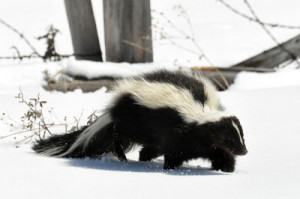What Do Skunks Do During the Winter?
By Chris Williams on September 30, 2014.
 A customer who was having trouble with skunks tearing up his yard was wondering whether this was going to go on all winter, or were the skunks getting ready to hibernate. Striped skunks don’t actually hibernate in winter, but they will slow down. During the very coldest part of the winter, they will stay in their dens, become relatively inactive, eat little, and sleep a lot. They enter a state of “torpor” when their body temperature, breathing, and metabolism drop, but not as severely as in hibernation.
A customer who was having trouble with skunks tearing up his yard was wondering whether this was going to go on all winter, or were the skunks getting ready to hibernate. Striped skunks don’t actually hibernate in winter, but they will slow down. During the very coldest part of the winter, they will stay in their dens, become relatively inactive, eat little, and sleep a lot. They enter a state of “torpor” when their body temperature, breathing, and metabolism drop, but not as severely as in hibernation.
Above Freezing? Time to Eat
During this groggy sleep, skunks can wake up periodically. If the weather allows (above 30° F.), they may briefly leave the den for some nighttime foraging. They do have to eat something after all, and their normal food can be a lot harder to come by in winter. Skunks also have to leave the den at least once in winter to empty their scent glands, so I’m told.
When their live food is available, skunks will feed on insects, earthworms, eggs, frogs, snakes, and similar small animals. They will also scrounge for berries, roots, leaves, grasses, and nuts. And of course, there is people garbage – available even in winter. Their diet is what gets skunks into trouble with people since they dig holes in lawns and even roll back sod looking for grubs, worms, and roots (see Skunks’ Digging Can Damage Lawns).
A Crowded Den Can Be Cozy
A skunk den is usually a ground burrow, with up to 5 openings. A skunk may take over an old ground hog or fox burrow, or dig its own. Skunks also den in hollow logs or under buildings, decks, or porches. Inside the den there are one to three separate chambers, one of which is used as a nest.
Skunks tend to re-use their winter dens. Skunks are normally solitary animals, but in winter, females den together, as many as 12 per den. Males usually den alone but may join the females. The shared body heat helps the skunks survive the winter. The winter denning period of sleeping and waking usually lasts about 100 days, then spring mating season begins.
I would think that this gentleman can expect the skunks to still be active for a little while. They probably won’t den up until after the first hard frost. There’s still time to contact Colonial Pest and have our nuisance wildlife experts remove skunks before they hunker down for the winter.